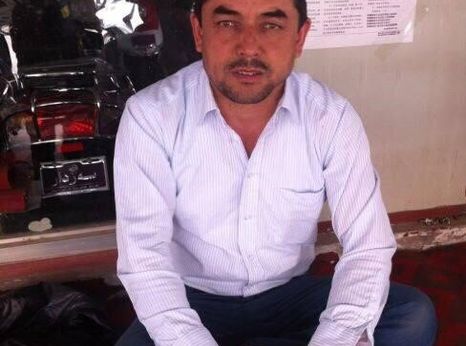Uyghur businessman imprisoned in secret trial

Abuduaini Kadier started an electric vehicles business in Kashgar, Xinjiang in 2007. Before he was sentenced in July 2017, he was reportedly put into a “transformation-through-education” facility between April and June 2017. There was no official information about his detention, about which his family only learned through a source in July 2017.
Abuduaini Kadier is also the father-in-law of Yiliyasijiang Reheman, who went missing in July 2017 while studying in Egypt. In July 2017, the Egyptian authorities started rounding up hundreds of Uyghur people in Egypt and handing them over to the Chinese government. Yiliyasijiang Reheman and his family tried to flee Egypt, but they didn’t make it onto the plane. He has not been seen or heard since and his wife believes that he was sent to a “transformation-through-education” facility.
Xinjiang is one of the most ethnically diverse regions in China. More than half of the region’s population of 22 million people belong to mostly Turkic and predominantly Muslim ethnic groups, including Uyghurs (around 11.3 million), Kazakhs (around 1.6 million) and other populations whose languages, cultures and ways of life vary distinctly from those of the Han who are the majority in “interior” China.
In March 2017, the Xinjiang government enacted the “De-extremification Regulation” that identifies and prohibits a wide range of behaviours labelled “extremist”, such as “spreading extremist thought”, denigrating or refusing to watch public radio and TV programmes, wearing burkas, having an “abnormal” beard, resisting national policies, and publishing, downloading, storing, or reading articles, publications, or audio-visual materials containing “extremist content”. The regulation also set up a “responsibility system” for government cadres for “anti-extremism” work and established annual reviews of their performance.
It is estimated that up to a million Uyghurs, Kazakhs and other predominantly Muslim people have been held in the “transformation-through-education” centres. The Chinese authorities had denied the existence of such facilities until October 2018, when they began describing them as voluntary, free “vocational training” centres. They claim that the objective of this vocational training is to provide people with technical and vocational education to enable them to find jobs and become “useful” citizens. China’s explanation, however, contradicts reports of beatings, food deprivation and solitary confinement that have been collected from former detainees.
China has rejected calls from the international community, including Amnesty, to allow independent experts unrestricted access to Xinjiang. Instead, China has made efforts to silence criticism by inviting delegations from different countries to visit Xinjiang for carefully orchestrated and closely monitored tours.